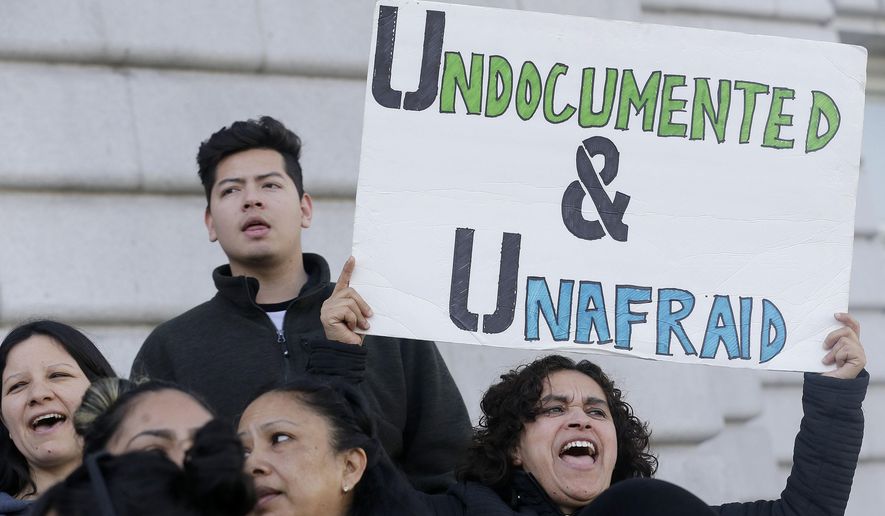A day after Attorney General Jeff Sessions issued guidance that narrowly defined a “sanctuary city,” the Justice Department is attempting to broaden its authority to compel such jurisdictions to cooperate with immigration authorities.
A provision included in the Justice Department’s proposed fiscal 2018 budget seeks to update a portion of federal law, U.S.C. 1373, which bans local governments from enacting policies that restrict or prohibit communications with federal immigration authorities “regarding the citizenship or immigration status, lawful or unlawful, of any individual.”
The proposed changes would require law enforcement to comply with federal immigration detainers — requests that inmates be held in custody for up to 48 hours beyond their scheduled release from jail in order to give federal immigration authorities time retrieve them.
The Justice Department and Homeland Security are seeking the change “to expand the scope to prevent state and local government officials from prohibiting or restricting any government law enforcement entity or official from complying with a lawful civil immigration detainer request,” according to the budget proposal.
The changes, which would have to be approved by Congress, would also ban local law enforcement agencies from adopting policies that ban inquires about nationality, citizenship, immigration status as well as certain other information.
Under an executive order issued by President Trump, the Justice Department has sought to require jurisdictions to prove they are in compliance with Section 1373 as a condition to receiving certain federal grants.
The budget proposal seeks to expand the breadth of federal grants that could be targeted under the order.
In an ongoing lawsuit brought by San Francisco and Santa Clara County in California, the Justice Department in April argued that only three DOJ grants could be revoked under the executive order: the Byrne Justice Assistance Grants, the COPS program and the State Criminal Alien Assistance Program, which pays local prisons and jails to hold illegal immigrants.
Analysts had earlier said all federal dollars sent to state and local jurisdictions, ranging from health to community development grants, could be at risk under the order.
Under the budget proposal, all Justice Department and Homeland Security Department grants would be at risk if jurisdictions failed to comply with the new expanded version of Section 1373.
“This is primarily an effort to clarify the administration’s intentions and one of the tools they would like to use to address the sanctuary problem,” said Jessica Vaughan, policy studies director at the Center for Immigration Studies, after reviewing the budget document. “It also head off some legal challenges that are inevitable as they proceed in trying to withhold certain federal grants over the definition of what is a sanctuary.”
Ms. Vaughan noted that the proposal would explicitly restrict non-compliance with federal law to law enforcement agencies, a key difference from the prior version Section 1373.
“They are specifying this applies to law enforcement agencies, not schools, not social workers,” she said. “They are changing the language to have all of this detail kind of information sharing just apply to all enforcement agencies.”
Cities targeted by the executive order have expressed confusion over the lack of any definition of what would qualify as a sanctuary jurisdictions. Many agencies say it was impossible to be out of compliance with the current federal law, the bans policies restricting communication with immigration authorities, because once inmates are booked in local jails their fingerprints and other data are automatically shared with Immigration and Customs Enforcement, alerting agents to the presence of any illegal immigrants.
But other police agencies have gone further to shield illegal immigrants, adopting policies to ban officers from inquiring about a person’s immigration status.
In San Francisco, which is in litigation with the Trump administration over the legality of the sanctuary city order, City Attorney Dennis Herrera took the administration to task over its “secretive” approach to amending the federal law.
“Once again, this administration has demonstrated why they can’t be trusted. They are trying to sneak major changes in the law through the back door because they cannot get them through the front,” Mr. Herrera said. “These proposed changes would fly in the face of the Constitution.”
Other groups said the attempt to change the compliance measure would have a huge impact on the federal government’s ability to compel local jurisdictions to assist immigration authorities in their deportation efforts.
“The plan is to use the federal budget to radically change the statute in order to put saber-tooth requirements into the law,” America’s Voice Education Fund said in a statement. “If approved, it would impose much harsher mandates on jurisdictions and turn each of them into holding pens for Trump’s deportation force.”
• Andrea Noble can be reached at anoble@washingtontimes.com.




Please read our comment policy before commenting.